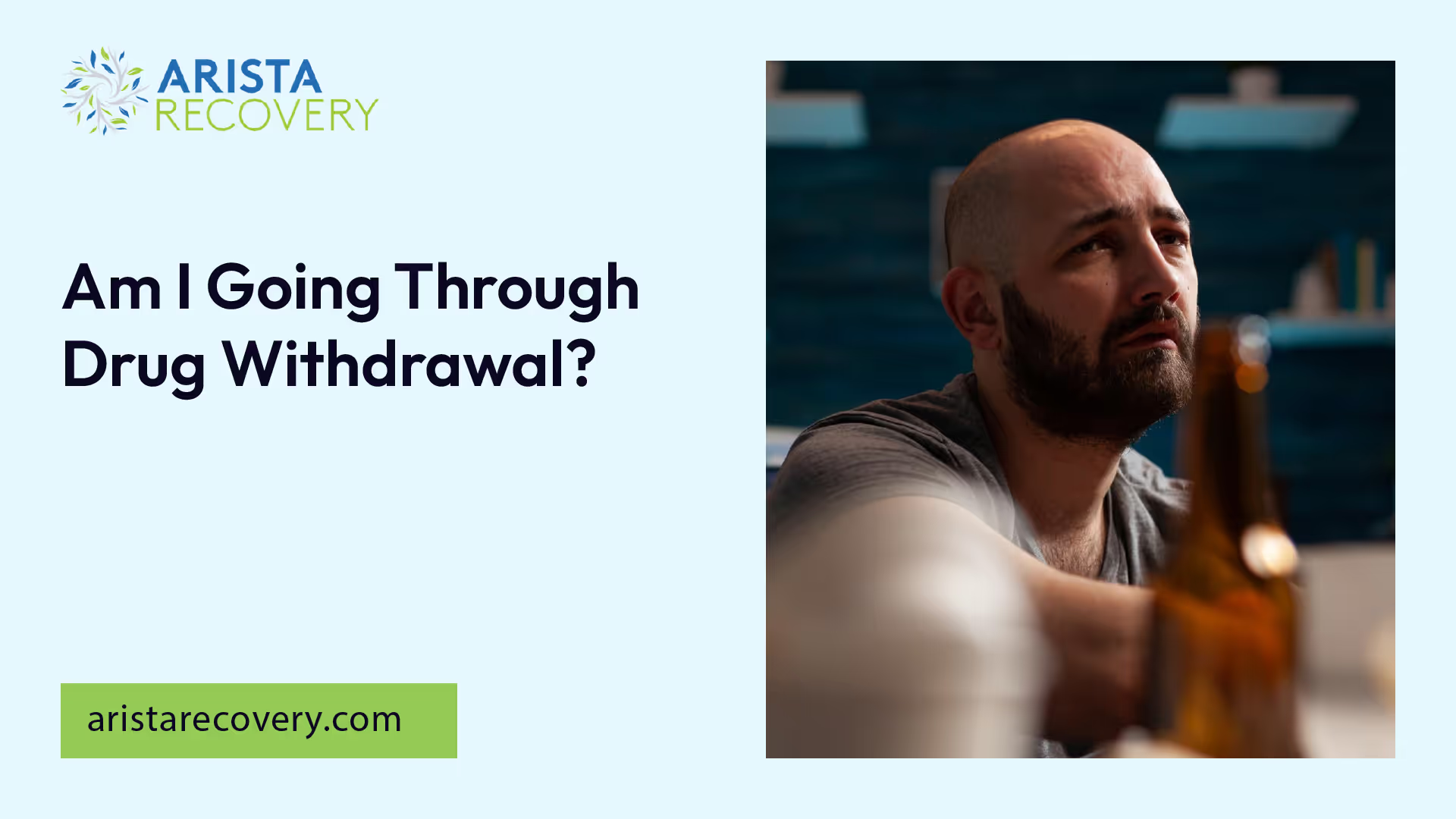Am I Going Through Drug Withdrawal?


Understanding Withdrawal Symptoms
Withdrawal symptoms are a critical aspect of the recovery process for those struggling with addiction. Recognizing the signs and understanding the severity of these symptoms can help an individual seek appropriate help and support.
Recognizing Withdrawal Signs
Identifying the signs of withdrawal is essential for anyone asking am I going through drug withdrawal. Symptoms can manifest in various forms, including physical, emotional, and psychological indicators. Common withdrawal signs may include:
SymptomsDescriptionHot and Cold SweatsFluctuations in body temperature.GoosebumpsSkin reactions often associated with anxiety or chills.Runny NoseCold-like symptoms that can occur during withdrawal.
These symptoms can vary in intensity based on the substance being withdrawn from. Some individuals may experience mild signs while others face more serious effects. It is crucial to understand what to expect during this process.
Severity of Withdrawal
The severity of withdrawal symptoms can range from mild to severe, particularly when withdrawing from substances like alcohol, benzodiazepines, or opioids. While some symptoms may be uncomfortable but manageable, others can pose significant health risks. According to healthdirect, severe withdrawal symptoms can include:
Withdrawal symptoms typically last from a few days to several weeks, depending on the substance and the individual's physical condition. Understanding the potential intensity and duration of these symptoms is vital for planning appropriate support and treatment. It is recommended to consult a healthcare professional before initiating withdrawal, especially for substances known to produce severe symptoms.
Symptoms of Addiction Withdrawal
Withdrawal from addictive substances can manifest in various ways, including physical signs and emotional or psychological symptoms. Understanding these symptoms is crucial for recognizing when someone may be going through drug withdrawal.
Physical Signs
Physical symptoms are among the most recognizable indicators of withdrawal. These may include:
Physical SymptomsDescriptionSweatingIncreased perspiration, often accompanied by chills.GoosebumpsThe skin may feel prickly or bumpy.Runny NoseNasal discharge similar to a cold.Hot and Cold FlashesAlternating sensations of feeling excessively hot or cold.
These symptoms can last from a few days to several weeks, but they typically diminish over time. Severe withdrawal can lead to more critical issues, especially for substances like alcohol or opioids.
Emotional and Psychological Symptoms
In addition to physical signs, withdrawal often includes emotional and psychological symptoms that can greatly impact an individual's mental state. These may include:
Emotional/Psychological SymptomsDescriptionAnxietyIncreased feelings of worry or fear.DepressionA sense of hopelessness or sadness.IrritabilityHeightened sensitivity or frustration.Mood SwingsRapid changes in emotions.
Managing these symptoms often requires medical support, particularly when dealing with substances such as alcohol, GHB, benzodiazepines, or ketamine [1]. Recognizing these symptoms can help in assessing whether one is experiencing withdrawal, prompting necessary steps for care and recovery.
Seeking Professional Help
Importance of Medical Support
When dealing with the question, "am I going through drug withdrawal?", it is crucial to seek medical support. Withdrawal symptoms can vary significantly depending on the substance involved and the individual's overall health. Symptoms may include feeling hot and cold, having goosebumps, or experiencing a runny nose, among others. In severe cases, especially during withdrawal from substances like alcohol, GHB, benzodiazepines, or ketamine, symptoms can become serious and even life-threatening.
Engaging with a healthcare professional allows individuals to discuss their concerns about withdrawal and receive tailored advice. Medical professionals can facilitate a safer withdrawal experience, monitor health changes, and suggest medications to manage symptoms effectively. Timely intervention can also help to reduce the risk of complications associated with withdrawal.
SubstanceWithdrawal SymptomsSignificant RisksAlcoholDelirium tremens, seizures, excessive sweatingLife-threatening complicationsBenzodiazepinesAnxiety, agitation, seizuresSevere anxiety or panic attacksOpioidsPain, nausea, vomiting, diarrheaRisk of overdose during taperingGHBAnxiety, insomnia, tremorsSevere withdrawal symptoms
Withdrawal Management Programs
Withdrawal from addiction can often be challenging, and professional withdrawal management programs play a significant role in supporting individuals through this process. These programs may be offered through both public and private services and aim to manage withdrawal symptoms, provide necessary support, and help prevent relapse [1].
Withdrawal management typically involves a combination of medical supervision and therapeutic support. The following table outlines some common features of withdrawal management programs:
FeatureDescriptionMedical MonitoringRegular check-ups to assess health and manage symptomsPsychological SupportAccess to counseling or therapy sessionsMedication AssistanceUse of medications to ease withdrawal symptomsRelapse PreventionStrategies to help individuals avoid returning to substance use
Participating in a formal withdrawal management program enhances the likelihood of successful recovery and helps individuals cope with the challenges associated with substance withdrawal.
Creating a Supportive Environment
Establishing a supportive environment is crucial for anyone experiencing drug withdrawal. This environment should provide safety, security, and access to necessary resources to alleviate withdrawal symptoms.
Safe Withdrawal Settings
It is important to have a secure environment when supporting someone through the withdrawal process. This can be at home, in a detox facility, or in a hospital setting. The safety of the individual undergoing withdrawal may depend on the type of substance used. For instance, healthdirect highlights that seeking advice from a doctor, health professional, or drug and alcohol service is recommended prior to commencing withdrawal.
In cases where there is significant dependency, such as with alcohol or benzodiazepines, a monitored setting is essential. Withdrawal symptoms from alcohol can appear within hours and may pose serious health risks. For those quiting cold turkey, this can lead to complications, including seizures [2].
SubstanceTypical Onset of Withdrawal SymptomsRisks Without Medical SupervisionAlcoholWithin hoursLife-threatening complicationsBenzodiazepinesVaries (days)Seizures, deliriumGHBWithin hoursSevere withdrawal symptomsKetamineVariesUnknown risks, psychological effects
Consulting Healthcare Professionals
When someone is considering withdrawal from addictive substances, consulting healthcare professionals is an essential step. Whether the individual feels mild discomfort or severe distress, medical guidance helps in assessing the situation accurately. It is particularly vital for those withdrawing from substances like alcohol, GHB, benzodiazepines, or ketamine to speak with a medical professional or addiction treatment service first [1].
Healthcare providers are able to develop tailored withdrawal management plans. They can monitor symptoms, provide necessary medications to ease discomfort, and intervene if serious complications arise. Continuous monitoring by medical experts can significantly reduce the health risks associated with withdrawal.
Additionally, having a structured plan that includes support from therapists and counselors can aid the recovery process. This multidisciplinary approach ensures a more comprehensive care plan, addressing both the physical and psychological aspects of withdrawal and addiction recovery.
Overcoming Addiction Challenges
Overcoming addiction presents numerous challenges, but with the right self-care techniques and support for caregivers, individuals can navigate through their recovery journey more effectively.
Self-Care Techniques
Self-care techniques are essential for individuals facing addiction. These practices not only help manage withdrawal symptoms but also contribute positively to overall well-being. Key techniques include:
Self-Care TechniqueDescriptionEating WellA balanced diet supports physical health and improves mood, providing the body with necessary nutrients.SleepingAdequate sleep is crucial for recovery, allowing the body to heal and regenerate.ExercisingPhysical activity releases endorphins, which can help reduce stress and improve feelings of happiness.SocializingBuilding a support system through social connections can provide emotional support and reduce feelings of isolation.Taking BreaksScheduling regular breaks to relax can help manage stress and prevent burnout.
These activities reinforce resilience and promote a healthier lifestyle, which is critical during recovery.
Support for Caregivers
Caregivers play a vital role in the recovery process. Their support can be instrumental in helping individuals overcome addiction. To better support someone going through withdrawal, caregivers should consider the following:
Support StrategyDescriptionClinical ConsultationsEngaging in professional consultations can clarify treatment options and possible outcomes. Accurate diagnoses are essential for effective care.Educating ThemselvesCaregivers should learn about addiction, withdrawal symptoms, and available resources to provide informed support.Encouraging Healthy HabitsAddressing self-care for both the caregiver and the individual in recovery fosters a supportive environment.Seeking Support for ThemselvesCaregiving can be demanding, and seeking support groups can help caregivers process their own feelings and challenges.
By implementing these strategies, caregivers can create an atmosphere of understanding and compassion, helping to facilitate a smoother recovery process for the individual facing addiction.
Impact of Mental Illness
Prevalence of Mental Health Disorders
Mental illness is prevalent in society, affecting a significant portion of the population. It is estimated that about 1 in 5 adults experience a mental illness in any given year. These disorders can emerge at any age, although most cases typically begin earlier in life. The commonality of mental health issues underscores the necessity for understanding their connection to addiction and withdrawal symptoms.
YearPercentage of Adults with Mental Illness202020%201919.1%201818.5%
Connecting Symptoms to Mental Health
The intersection between mental health disorders and addiction cannot be overlooked. Symptoms of mental health conditions can sometimes manifest as physical problems, such as stomach pain, back pain, headaches, or other unexplained aches [4]. These symptoms can complicate the experience of withdrawal, making it challenging for individuals to recognize what they are feeling.
Mental illness is a leading cause of disability, and those who do not receive treatment may experience severe emotional, behavioral, and physical health problems [4]. If individuals exhibit any signs or symptoms of mental illness, it is crucial for them to seek assistance from a primary care provider or mental health professional. Most mental illnesses do not improve on their own and may require structured support to address not only the mental health challenge but also the addiction or withdrawal issues associated with it.
References
[2]:
[3]:
[4]:
You’re not alone in this.
When mental health challenges and addiction intersect, it can feel isolating. At Arista, we offer compassionate, evidence-based, and trauma-informed care to help you heal, grow, and move forward.
You’re not alone in this.
When mental health challenges and addiction intersect, it can feel isolating. At Arista, we offer compassionate, evidence-based, and trauma-informed care to help you heal, grow, and move forward.
Support that moves with you.
You’ve taken a brave first step. At Arista Recovery, we’re here to help you continue with best-in-class care designed for long-term healing and support.
.webp)






